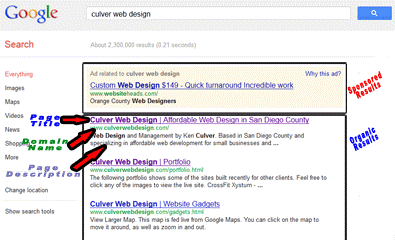


“I want my site to be at the top of the Google search results.”
That is how the conversation usually begins. The request is understandable, but the problem is that every business or organization wants their site to be at the top of the results, and the truth is not everyone gets to be there. To understand this better, let’s look at what search engines do.
Simply stated, when a web user enters a word or phrase into a search engine, it returns a rank-ordered list the search engine company believes to be the most relevant to the user. Those results are compiled using a complex formula or “algorithm.” That formula is a tightly-held secret by each search engine operator in order to prevent unethical manipulation of search engine results. With that basic understanding, when someone tells you that they can somehow manipulate your site to come up at the top of the list, it is simply not true (other than paid listings which are addressed in the column to the rightbelow). If there were some type of switch your web developer could flip to place your site at the top of the search results, everyone would do exactly that. As a result, web developers try to employ ‘best practices’ to ensure the search engines have the best chance to see their site, and the search engines guard their changing formula, creating a high-tech game of ‘cat-and-mouse’ that is constantly evolving.
While the exact algorithm used by the search engines is never disclosed, developers have a general understanding of the factors driving good performance in search engines. Here are a few factors:
www.BobsTools.com, he will rank poorly if a user searches for “left handed hammer.” On the other hand, the same search would most certainly give high ranking to a site called www.Left-Handed-Hammers.com. Remember, search engines give great weight to domain names. Your site can have more than one domain name and they are very inexpensive. bob, tools, hammer, left, handed will only cause you to be considered with thousands of other sites around the world selling tools or hammers. If your key words include the phrase “left handed hammer,” you are far more likely to place highly in the search results. Carefully selected phrases of three to five words may be quite helpful in reaching your desired audience. Accordingly, when preparing your site content, you should select content headings that support your key words and phrases.
Accordingly, when preparing your site content, you should select content headings that support your key words and phrases.Boston plumber. You should bring those terms together as much as practical in your content. Keeping your content fresh and including informative newsletters or current events for your business will also help the search engines see your site as current and relevant.While you and your developer can control most of the above referenced design factors, there are additional factors over which you will have less control. Among them:
Search engines offer site-owners the opportunity to get top-of-the-page results for a fee. These are called “sponsored listings” and often appear in a colored box at the top of the search results list. If you elect to subscribe to this type of advertising, your site will be return as a sponsored listing when users search on words relevant to your site. You pay a small fee each time your listing comes up, but unlike many forms of advertising you are only paying to reach those already interested in your type of business or service. The companies generally have arrangements where you can specify a maximum number of returns in order to limit your advertising costs to a pre-arranged amount. After that time, your site will no longer show up in the sponsored listings.
While there are aspects of paid listings that are appealing, research shows that over 70% of web users never click on sponsored listings, no matter how relevant they may actually be. They reject those listing as paid advertisements; opting instead to select from the “organic” listings which are earned instead of being purchased. Before considering purchasing this form of advertising, consider your own web experience and what your habits have been with respect to clicking on sponsored listings.